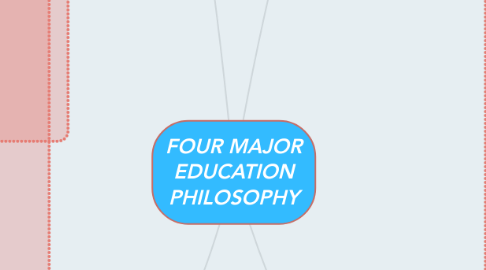
1. Realism
1.1. The aim of education
1.1.1. Understanding the material world through inquiry
1.1.2. A study of science and the scientific method
1.1.3. A need to know the world in order to ensure survival
1.1.4. Basic and essential knowledge with a no-nonsense approach
1.1.5. A need to know the world in order to ensure survival
1.2. Proponet
1.2.1. Aristotle
1.3. The nature of idealism
1.4. The pedagogy used
1.4.1. Methods of arriving at facts
1.4.2. Supports formal ways of teaching
1.4.3. Children should be given positive rewards
1.4.4. Precision and order
1.5. The curriculum
1.5.1. Practical and useful
1.5.2. Physical activity has educational value
1.5.3. Attention to the complete person
1.5.4. Extensive use of pictures
1.6. The subject
1.6.1. Chemistry
1.6.2. Biology
1.6.3. Physics
1.7. Roles of students
1.8. Roles of teachers
1.8.1. Realists emphasize the role of the teacher
1.8.2. Should teach students what they need to survive
1.8.3. Should teach the students the essentials
1.8.4. Material presented in a systematic and organized way
1.9. Student-centred
2. Existentialism
2.1. The aim of education
2.1.1. To help students understand and appreciate themselves as a unique individuals
2.1.2. To educate the whole person
2.1.3. To help the learners become fully their authentic
2.2. Proponents
2.2.1. Soren Kierkegaard
2.2.2. Martin Heidegger
2.2.3. Albert Camus
2.2.4. Jean-Paul Sartre
2.3. The nature of existentialism
2.4. The pedagogy used
2.4.1. Focus is on the individual
2.4.2. Values education us a matter of choice that goes throughout existence
2.4.3. Criticism to any individual work is less important
2.5. The curriculum
2.5.1. Self-paced
2.5.2. Self-directed
2.5.3. Students are given options
2.6. The subject
2.6.1. Literature
2.6.2. Arts
2.6.3. Drama
2.6.4. Philosophy
2.7. Roles of students
2.7.1. To freely choose what subjects they want to study
2.7.2. To define their own essence
2.8. Roles of teachers
2.8.1. To relate with each student openly and honestly
2.8.2. Create an environment in which they are freely to choose their own preferred way
2.8.3. Poser of alternatives
2.9. Student-centred
3. Idealism
3.1. The aim of education
3.1.1. Search for truth
3.1.2. Self-realization
3.1.3. Character development
3.2. Proponent
3.2.1. Plato
3.3. The nature of idealism
3.4. The curriculum
3.4.1. To teach students to think
3.4.2. Memorization vs Creativity
3.4.3. Art and Science
3.4.4. Art and Science
3.5. The subject
3.5.1. Mathematics
3.5.2. Biology
3.5.3. Physics
3.5.4. Literature
3.5.5. Art
3.5.6. Grammar
3.5.7. History
3.6. The pedagogy used
3.6.1. Intuitive approach
3.6.2. Lecture method
3.6.3. Project
3.6.4. Self- divided activity
3.6.5. Supplement activities
3.6.6. Library research
3.7. Roles of students
3.8. Roles of teachers
3.8.1. Assist students in choosing important material
3.8.2. Serve as exemplary models
3.8.3. Teachers are expected to encourage students to ask questions
3.8.4. Socratic characteristic
3.8.5. Infuses them with a desire to improve their thinking in the deepest possible way
3.9. Teacher-centred
4. Essentialism
4.1. The aim of education
4.1.1. Provide students with a strong academic foundations
4.1.2. Hard work is encouraged
4.1.3. Discipline is maintained
4.1.4. Basic skills are focused upon
4.1.5. Patriotism
4.2. Proponent
4.2.1. William Bagley
4.2.2. H.G Rickover
4.2.3. Paul Copperman
4.3. The nature of Essentialism
4.4. The pedagogy used
4.4.1. Emphasis on the significance of curriculum
4.4.2. Teachers need to be patient and, have a positive attitude
4.4.3. Teachers and parents should plan out a proper future for them
4.5. The curriculum
4.5.1. Basic subjects should be taught and impractical subjects should not be part of curriculum
4.5.2. Skills such as reading, writing, computers and measurement
4.5.3. Teach how to survive, be productive and how to live as a proper members of society
4.6. The subject
4.6.1. Foreign language
4.6.2. Natural science
4.6.3. History
4.7. Roles of students
4.7.1. Learn passively
4.7.2. Learn morals, values and manners
4.7.3. The students are not free to explore, questions and test materials
4.8. Roles of teachers
4.8.1. The leader of the classroom
4.8.2. To keep order in the classroom
4.8.3. Control the students with distributions of reward penalties
